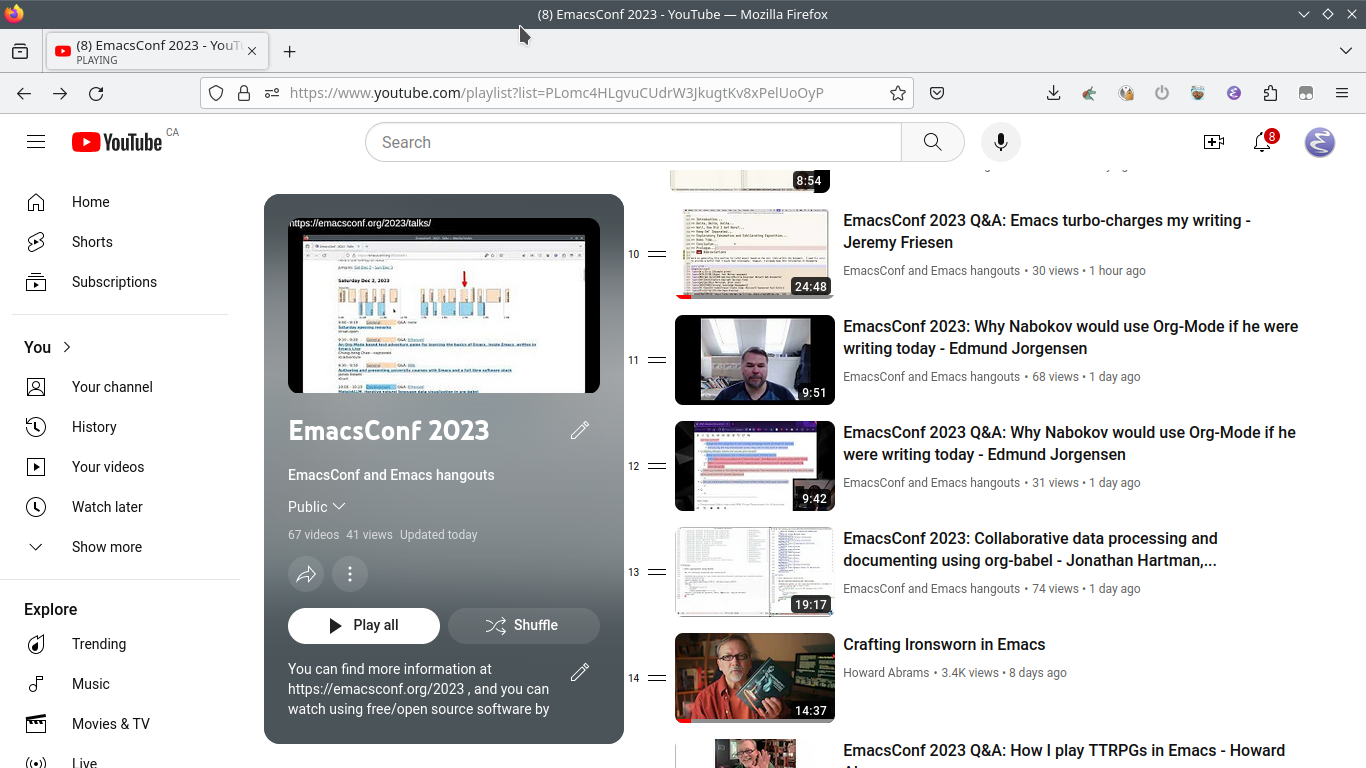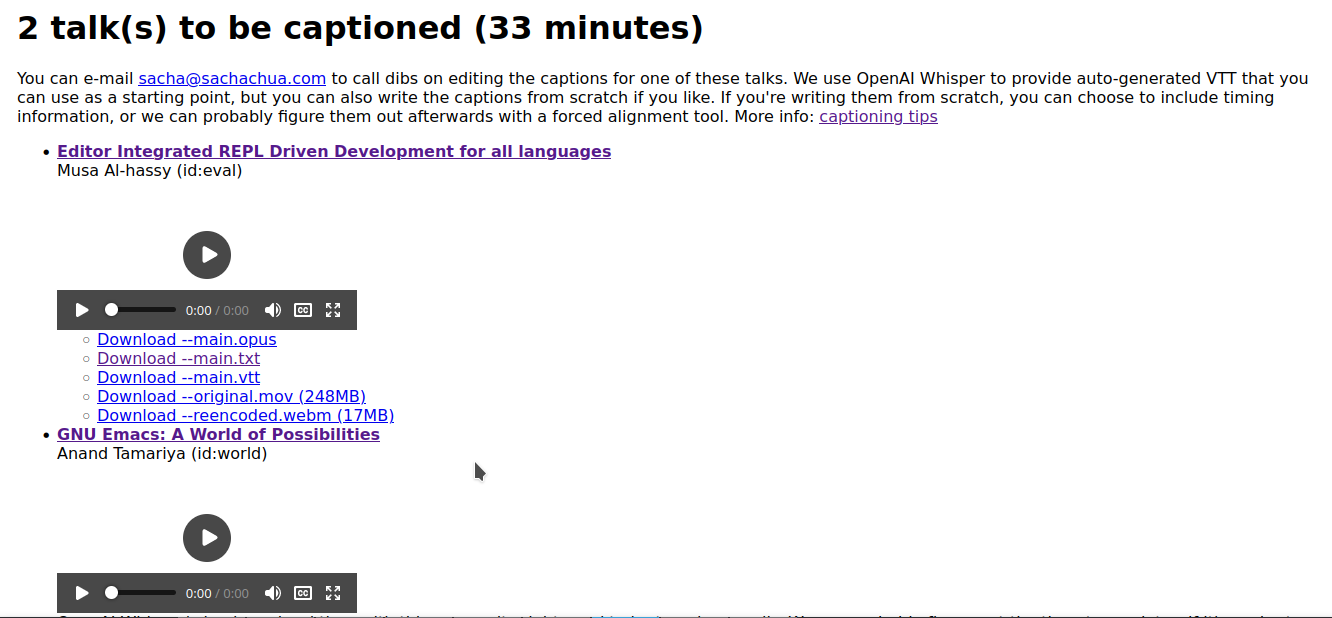EmacsConf backstage: Making a (play)list, checking it twice
| emacs, emacsconf, spookfox, youtube, videoI wanted the EmacsConf 2023 Youtube and Toobnix playlists to mostly reflect the schedule of the conference by track, with talks followed by their Q&A sessions (if recorded).
The list
I used Emacs Lisp to generate a list of videos in the order I wanted. That Sunday closing remarks aren't actually in the playlists because they're combined with the Q&A for my session on how we run Emacsconf.
emacsconf-extract-check-playlists: Return a table for checking playlist order.
(defun emacsconf-extract-check-playlists () "Return a table for checking playlist order." (let ((pos 0)) (seq-mapcat (lambda (o) (delq nil (list (when (emacsconf-talk-file o "--main.webm") (cl-incf pos) (list pos (plist-get o :title) (org-link-make-string (plist-get o :youtube-url) "YouTube") (org-link-make-string (plist-get o :toobnix-url) "Toobnix"))) (when (emacsconf-talk-file o "--answers.webm") (cl-incf pos) (list pos (concat "Q&A: " (plist-get o :title)) (org-link-make-string (plist-get o :qa-youtube-url) "YouTube") (org-link-make-string (plist-get o :qa-toobnix-url) "Toobnix")))))) (emacsconf-publish-prepare-for-display (emacsconf-get-talk-info)))))
| 1 | An Org-Mode based text adventure game for learning the basics of Emacs, inside Emacs, written in Emacs Lisp | YouTube | Toobnix |
| 2 | Authoring and presenting university courses with Emacs and a full libre software stack | YouTube | Toobnix |
| 3 | Q&A: Authoring and presenting university courses with Emacs and a full libre software stack | YouTube | Toobnix |
| 4 | Teaching computer and data science with literate programming tools | YouTube | Toobnix |
| 5 | Q&A: Teaching computer and data science with literate programming tools | YouTube | Toobnix |
| 6 | Who needs Excel? Managing your students qualifications with org-table | YouTube | Toobnix |
| 7 | one.el: the static site generator for Emacs Lisp Programmers | YouTube | Toobnix |
| 8 | Q&A: one.el: the static site generator for Emacs Lisp Programmers | YouTube | Toobnix |
| 9 | Emacs turbo-charges my writing | YouTube | Toobnix |
| 10 | Q&A: Emacs turbo-charges my writing | YouTube | Toobnix |
| 11 | Why Nabokov would use Org-Mode if he were writing today | YouTube | Toobnix |
| 12 | Q&A: Why Nabokov would use Org-Mode if he were writing today | YouTube | Toobnix |
| 13 | Collaborative data processing and documenting using org-babel | YouTube | Toobnix |
| 14 | How I play TTRPGs in Emacs | YouTube | Toobnix |
| 15 | Q&A: How I play TTRPGs in Emacs | YouTube | Toobnix |
| 16 | Org-Mode workflow: informal reference tracking | YouTube | Toobnix |
| 17 | (Un)entangling projects and repos | YouTube | Toobnix |
| 18 | Emacs development updates | YouTube | Toobnix |
| 19 | Emacs core development: how it works | YouTube | Toobnix |
| 20 | Top 10 ways Hyperbole amps up Emacs | YouTube | Toobnix |
| 21 | Using Koutline for stream of thought journaling | YouTube | Toobnix |
| 22 | Parallel text replacement | YouTube | Toobnix |
| 23 | Q&A: Parallel text replacement | YouTube | Toobnix |
| 24 | Eat and Eat powered Eshell, fast featureful terminal inside Emacs | YouTube | Toobnix |
| 25 | The browser in a buffer | YouTube | Toobnix |
| 26 | Speedcubing in Emacs | YouTube | Toobnix |
| 27 | Emacs MultiMedia System (EMMS) | YouTube | Toobnix |
| 28 | Q&A: Emacs MultiMedia System (EMMS) | YouTube | Toobnix |
| 29 | Programming with steno | YouTube | Toobnix |
| 30 | Mentoring VS-Coders as an Emacsian (or How to show not tell people about the wonders of Emacs) | YouTube | Toobnix |
| 31 | Q&A: Mentoring VS-Coders as an Emacsian (or How to show not tell people about the wonders of Emacs) | YouTube | Toobnix |
| 32 | Emacs saves the Web (maybe) | YouTube | Toobnix |
| 33 | Q&A: Emacs saves the Web (maybe) | YouTube | Toobnix |
| 34 | Sharing Emacs is Caring Emacs: Emacs education and why I embraced video | YouTube | Toobnix |
| 35 | Q&A: Sharing Emacs is Caring Emacs: Emacs education and why I embraced video | YouTube | Toobnix |
| 36 | MatplotLLM, iterative natural language data visualization in org-babel | YouTube | Toobnix |
| 37 | Enhancing productivity with voice computing | YouTube | Toobnix |
| 38 | Q&A: Enhancing productivity with voice computing | YouTube | Toobnix |
| 39 | LLM clients in Emacs, functionality and standardization | YouTube | Toobnix |
| 40 | Q&A: LLM clients in Emacs, functionality and standardization | YouTube | Toobnix |
| 41 | Improving compiler diagnostics with overlays | YouTube | Toobnix |
| 42 | Q&A: Improving compiler diagnostics with overlays | YouTube | Toobnix |
| 43 | Editor Integrated REPL Driven Development for all languages | YouTube | Toobnix |
| 44 | REPLs in strange places: Lua, LaTeX, LPeg, LPegRex, TikZ | YouTube | Toobnix |
| 45 | Literate Documentation with Emacs and Org Mode | YouTube | Toobnix |
| 46 | Q&A: Literate Documentation with Emacs and Org Mode | YouTube | Toobnix |
| 47 | Windows into Freedom | YouTube | Toobnix |
| 48 | Bringing joy to Scheme programming | YouTube | Toobnix |
| 49 | Q&A: Bringing joy to Scheme programming | YouTube | Toobnix |
| 50 | GNU Emacs: A World of Possibilities | YouTube | Toobnix |
| 51 | Q&A: GNU Emacs: A World of Possibilities | YouTube | Toobnix |
| 52 | A modern Emacs look-and-feel without pain | YouTube | Toobnix |
| 53 | The Emacsen family, the design of an Emacs and the importance of Lisp | YouTube | Toobnix |
| 54 | Q&A: The Emacsen family, the design of an Emacs and the importance of Lisp | YouTube | Toobnix |
| 55 | emacs-gc-stats: Does garbage collection actually slow down Emacs? | YouTube | Toobnix |
| 56 | Q&A: emacs-gc-stats: Does garbage collection actually slow down Emacs? | YouTube | Toobnix |
| 57 | hyperdrive.el: Peer-to-peer filesystem in Emacs | YouTube | Toobnix |
| 58 | Q&A: hyperdrive.el: Peer-to-peer filesystem in Emacs | YouTube | Toobnix |
| 59 | Writing a language server in OCaml for Emacs, fun, and profit | YouTube | Toobnix |
| 60 | Q&A: Writing a language server in OCaml for Emacs, fun, and profit | YouTube | Toobnix |
| 61 | What I learned by writing test cases for GNU Hyperbole | YouTube | Toobnix |
| 62 | Q&A: What I learned by writing test cases for GNU Hyperbole | YouTube | Toobnix |
| 63 | EmacsConf.org: How we use Org Mode and TRAMP to organize and run a multi-track conference | YouTube | Toobnix |
| 64 | Q&A: EmacsConf.org: How we use Org Mode and TRAMP to organize and run a multi-track conference | YouTube | Toobnix |
| 65 | Saturday opening remarks | YouTube | Toobnix |
| 66 | Saturday closing remarks | YouTube | Toobnix |
| 67 | Sunday opening remarks | YouTube | Toobnix |
| 68 | Sunday closing remarks | YouTube | Toobnix |
YouTube
I bulk-added the Youtube videos to the playlist. The videos were not in order because I uploaded some late submissions and forgotten videos, which then got added to the end of the list.
I tried using the API to sort the playlist. This got it most of the way there, and then I sorted the rest by hand.
emacsconf-extract-youtube-api-sort-playlist: Try to roughly sort the playlist.
(defun emacsconf-extract-youtube-api-sort-playlist (&optional dry-run-only) "Try to roughly sort the playlist." (interactive) (setq emacsconf-extract-youtube-api-playlist (seq-find (lambda (o) (let-alist o (string= .snippet.title (concat emacsconf-name " " emacsconf-year)))) (assoc-default 'items emacsconf-extract-youtube-api-playlists))) (setq emacsconf-extract-youtube-api-playlist-items (emacsconf-extract-youtube-api-paginated-request (concat "https://youtube.googleapis.com/youtube/v3/playlistItems?part=snippet,contentDetails,status&forMine=true&order=date&maxResults=100&playlistId=" (url-hexify-string (assoc-default 'id emacsconf-extract-youtube-api-playlist))))) (let* ((playlist-info emacsconf-extract-youtube-api-playlists) (playlist-items emacsconf-extract-youtube-api-playlist-items) (info (emacsconf-publish-prepare-for-display (emacsconf-get-talk-info))) (slugs (seq-map (lambda (o) (plist-get o :slug)) info)) (position (1- (length playlist-items))) result) ;; sort items (mapc (lambda (talk) (when (plist-get talk :qa-youtube-id) ;; move the q & a (let ((video-object (emacsconf-extract-youtube-find-url-video-in-list (plist-get talk :qa-youtube-url) playlist-items))) (let-alist video-object (cond ((null video-object) (message "Could not find video for %s" (plist-get talk :slug))) ;; not in the right position, try to move it ((< .snippet.position position) (let ((video-id .id) (playlist-id .snippet.playlistId) (resource-id .snippet.resourceId)) (message "Trying to move %s Q&A to %d from %d" (plist-get talk :slug) position .snippet.position) (add-to-list 'result (list (plist-get talk :slug) "answers" .snippet.position position)) (unless dry-run-only (plz 'put "https://www.googleapis.com/youtube/v3/playlistItems?part=snippet" :headers `(("Authorization" . ,(url-oauth-auth "https://youtube.googleapis.com/youtube/v3/")) ("Accept" . "application/json") ("Content-Type" . "application/json")) :body (json-encode `((id . ,video-id) (snippet (playlistId . ,playlist-id) (resourceId . ,resource-id) (position . ,position)))))))))) (setq position (1- position)))) ;; move the talk if needed (let ((video-object (emacsconf-extract-youtube-find-url-video-in-list (plist-get talk :youtube-url) playlist-items))) (let-alist video-object (cond ((null video-object) (message "Could not find video for %s" (plist-get talk :slug))) ;; not in the right position, try to move it ((< .snippet.position position) (let ((video-id .id) (playlist-id .snippet.playlistId) (resource-id .snippet.resourceId)) (message "Trying to move %s to %d from %d" (plist-get talk :slug) position .snippet.position) (add-to-list 'result (list (plist-get talk :slug) "main" .snippet.position position)) (unless dry-run-only (plz 'put "https://www.googleapis.com/youtube/v3/playlistItems?part=snippet" :headers `(("Authorization" . ,(url-oauth-auth "https://youtube.googleapis.com/youtube/v3/")) ("Accept" . "application/json") ("Content-Type" . "application/json")) :body (json-encode `((id . ,video-id) (snippet (playlistId . ,playlist-id) (resourceId . ,resource-id) (position . ,position)))))) )))) (setq position (1- position)))) (nreverse info)) result))
I needed to sort some of the videos manually. Trying to scroll by dragging items to the top of the currently-displayed section of the list was slow, and dropping the item near the top of the list so that I could pick it up again after paging up was a little disorienting. Fortunately, keyboard scrolling with page-up and page-down worked even while dragging an item, so that was what I ended up doing: select the item and then page-up while dragging.
YouTube doesn't display numbers for the playlist positions, but this will add them. The numbers don't dynamically update when the list is reordered, so I just re-ran the code after moving things around.
emacsconf-extract-youtube-spookfox-add-playlist-numbers: Number the playlist for easier checking.
(defun emacsconf-extract-youtube-spookfox-add-playlist-numbers () "Number the playlist for easier checking. Related: `emacsconf-extract-check-playlists'." (interactive) (spookfox-js-injection-eval-in-active-tab "[...document.querySelectorAll('ytd-playlist-video-renderer')].forEach((o, i) => { o.querySelector('.number')?.remove(); let div = document.createElement('div'); div.classList.add('number'); div.textContent = i; o.prepend(div) }))" t))

In retrospect, I could probably have just cleared the playlist and then added the videos using the in the right order instead of fiddling with inserting things.
Toobnix (Peertube)
Toobnix (Peertube) doesn't seem to have a way to bulk-add videos to a playlist (or even to bulk-set their visibility). I started trying to figure out how to use the API, but I got stuck because my token didn't seem to let me access unlisted videos or do other things that required proper authentication. Anyway, I came up with this messy hack to open the videos in sequence and add them to the playlist using Spookfox.
(defun emacsconf-extract-toobnix-set-up-playlist () (interactive) (mapcar (lambda (o) (when (plist-get o :toobnix-url) (browse-url (plist-get o :toobnix-url)) (read-key "press a key when page is loaded") (spookfox-js-injection-eval-in-active-tab "document.querySelector('.action-button-save').click()" t) (spookfox-js-injection-eval-in-active-tab "document.querySelector('my-peertube-checkbox').click()" t) (read-key "press a key when saved to playlist")) (when (plist-get o :qa-toobnix-url) (browse-url (plist-get o :qa-toobnix-url)) (read-key "press a key when page is loaded") (spookfox-js-injection-eval-in-active-tab "document.querySelector('.action-button-save').click()" t) (spookfox-js-injection-eval-in-active-tab "document.querySelector('my-peertube-checkbox').click()" t) (read-key "press a key when saved to playlist"))) (emacsconf-publish-prepare-for-display (emacsconf-get-talk-info))))
Maybe next year, I might be able to figure out how to use the APIs to do this stuff automatically.
This code is in emacsconf-extract.el.

